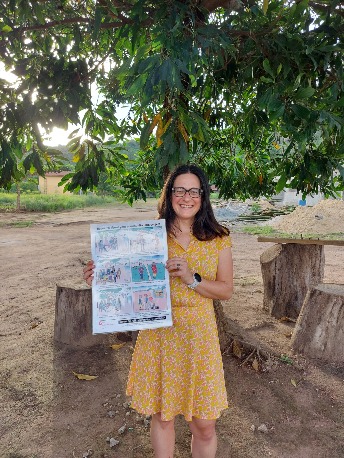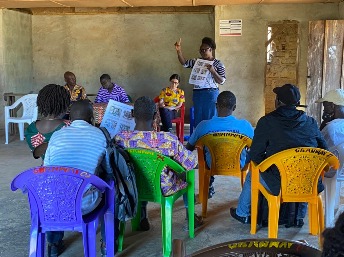A Small Grant well spent: dr. Caitlin Ryan reports on her work in Sierra Leone and Liberia

In juni 2022 the research proposal of dr. Caitlin Ryan, was one of the five excellent proposals that we could award with a Sustainable Society Small Grant. Now she reports on her results.
Ryan received the grant to disseminate research findings on ongoing land reform to stakeholder communities in Sierra Leone and Liberia, and to do this in a way that is culturally appropriate, useful, and intelligible. Land reform in both countries aims to give more formal/statutory land ownership rights at the level of communities. This can make land governance more inclusive of women and youth, and will decrease conflicts.
Dr. Caitlin Ryan, Assistant Professor of International Security in the Faculty of Arts:
Last year I conducted a 3-month qualitative research project in 40 communities across both countries. This year, I wanted to validate and disseminate my findings with communities in a way that would resonate with them. With funding from SuSo, I hired cartoon artists in both countries to draw key findings, and to make posters that we could take to community meetings. I also used the funds to provide food and transportation for attendees.
Working with the artists to decide how to depict the research findings was a fun challenge. While people in both countries are familiar with informational cartoon campaigns, I had multiple conversations with the artists to ensure that the drawings would be meaningful for communities while representing what I needed to show.
Findings in Sierra Leone and Liberia
For Sierra Leone, the poster showed that people were happy to have a better understanding of their land boundaries, and that now people knew about women’s land rights, but that women are still sometimes excluded from decision-making on land.
In the Liberian poster, we showed a similar finding about women not always being included in decision-making on land. We also showed that sometimes during the land reform process, influential people try to take land, even though the community-level land management committees try to prevent this.
But is it understood?
The next challenge was in how to engage people in a discussion about the poster (and thus the research findings). In the first community, I underestimated this and I don’t think people understood it as much as I’d hoped. The expertise of my Sierra Leonean colleagues, Josephine Margai and Joseph Conteh, was crucial in deciding how to better explain each panel one-by-one to have an engaging discussion with attendees. I carried these lessons with me to Liberia, and worked with my Liberian colleagues, Kou Gbaintor-Johnson and Regina George, to ensure that we could use the Liberian poster in the same way.
Two important things
Ultimately, the posters allowed me to do two important things.
Firstly, they provided a great way to validate my findings, to draw out nuances in what is happening, and how people feel about this. I was happy when people expressed how they felt ‘represented’ by the posters.
Secondly, the posters allowed me to give communities tangible evidence that I came back and shared my findings. In contexts where academic research always involves knowledge extraction, it was important that I was able to keep go back and talk with people about the knowledge I gained from them.

| Last modified: | 02 June 2023 2.30 p.m. |
More news
-
04 July 2025
University of Groningen awards various prizes during Ceremony of Merits
The UG awarded different prizes to excellent researchers and students during the Ceremony of Merits on 4 July 2025.
-
02 July 2025
Relinde Weil reappointed as a member of the Supervisory Board UG
The Minister of Education has reappointed Relinde Weil for a second term as a member of the Supervisory Board of the University of Groningen.
